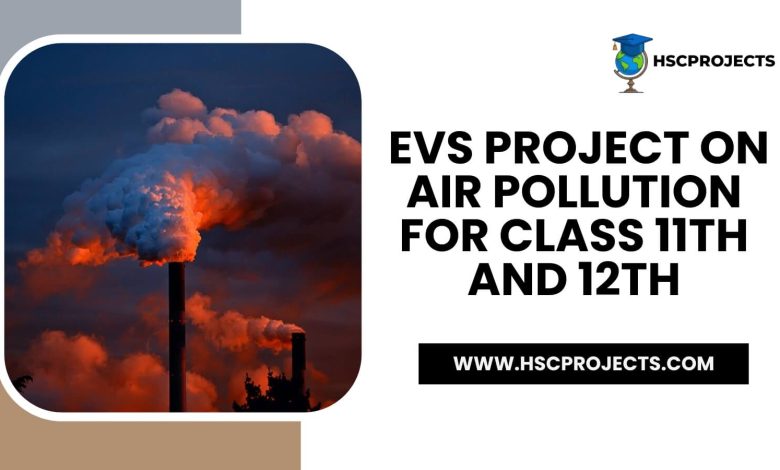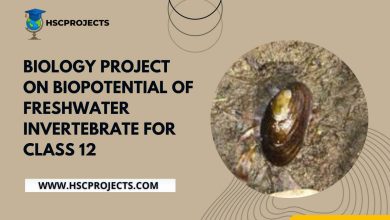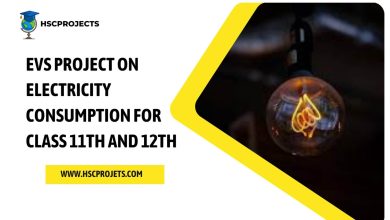
Evs Project On Air Pollution For Class 11th And 12th
Acknowledgement:
I would like to take this opportunity to express my heartfelt gratitude to the individuals and organizations who have played a significant role in the completion of this Evs Project on Air Pollution. Their unwavering support, guidance, and contributions have been instrumental in the success of this endeavor.
First and foremost, I would like to extend my sincere appreciation to my teacher [mention teacher’s name] for providing me with valuable insights and guidance throughout the project. Their expertise and encouragement have been invaluable in shaping my understanding of the subject matter and guiding me in the right direction.
I am also grateful to [mention names of experts, environmentalists, or researchers] for their assistance and willingness to share their knowledge and experiences. Their valuable inputs during interviews, discussions, or consultations have enriched the project and provided a deeper understanding of the complexities surrounding air pollution.
I would like to acknowledge the support and cooperation received from [mention names of organizations or institutions]. Their provision of necessary resources, such as research materials, data, and access to facilities, has significantly contributed to the project’s comprehensiveness and credibility.
Furthermore, I extend my thanks to my friends and classmates who have been a constant source of encouragement and support throughout the project. Their feedback and constructive criticism have helped me refine my ideas and strengthen the project’s overall quality.
Lastly, I would like to express my gratitude to my family for their unwavering support and understanding during the project’s duration. Their encouragement, patience, and belief in my abilities have been vital in keeping me motivated and focused.
I acknowledge that this project would not have been possible without the collective effort and support of these individuals and organizations. Their contributions have truly made a difference in shaping this project on air pollution, and I am immensely grateful for their involvement.
Once again, I extend my heartfelt thanks to everyone who has played a role in this project. Your support and guidance have been invaluable, and I am grateful for the opportunity to work on such an important topic under your guidance.
Introduction:
Air pollution is a pressing environmental issue that has garnered significant attention worldwide due to its detrimental effects on human health, ecosystems, and the overall well-being of our planet. The continuous release of pollutants into the atmosphere from various sources has resulted in a degraded air quality that poses severe risks to both the environment and public health.
The primary objective of this Evs Project on Air Pollution is to shed light on the seriousness of this issue and raise awareness among individuals, communities, and policymakers. By understanding the causes, consequences, and potential solutions related to air pollution, we can take proactive measures to address and mitigate its harmful effects.
Air pollution originates from multiple sources, both natural and human-induced. Natural sources include volcanic eruptions, wildfires, and dust storms, while human activities contribute significantly to the problem. Emissions from industries, power plants, vehicles, and improper waste disposal are among the primary culprits responsible for air pollution.
The consequences of air pollution are far-reaching and impact various aspects of our lives. It adversely affects human health, leading to respiratory problems, cardiovascular diseases, allergies, and even premature death. Additionally, air pollution has severe implications for ecosystems, harming plant and animal life and disrupting delicate ecological balances. Furthermore, it contributes to climate change by influencing the Earth’s radiation balance and exacerbating global warming.
Recognizing the urgency of the situation, it is essential to explore and implement effective measures to combat air pollution. Through this project, we aim to provide insights into the possible solutions and strategies that can be adopted at individual, community, and governmental levels. By promoting sustainable practices, advocating for stricter emission controls, and encouraging the use of clean energy sources, we can make significant progress in reducing air pollution levels and preserving the health of our planet.
By increasing awareness and understanding of air pollution, we can empower individuals to make informed choices and take actions that contribute to a cleaner and healthier future. This project serves as a platform to educate and inspire students, policymakers, and the general public to prioritize and actively engage in efforts to combat air pollution.
In conclusion, this Evs Project on Air Pollution aims to highlight the severity of the problem and emphasize the importance of addressing it promptly. By comprehending the causes and consequences of air pollution and exploring potential solutions, we can pave the way for a sustainable and healthier future for ourselves and future generations.

Evs Project on Air Pollution:
The Evs Project on Air Pollution is a comprehensive study that delves into the multifaceted aspects of air pollution. It encompasses an in-depth analysis of its causes, effects, and potential solutions. By conducting thorough research and gathering relevant data, this project seeks to enhance awareness among individuals, communities, and policymakers regarding the pressing need to tackle air pollution promptly and effectively.
One of the primary objectives of this project is to identify and examine the various causes of air pollution. It explores both natural and anthropogenic factors that contribute to the degradation of air quality. Natural causes include volcanic eruptions, dust storms, and pollen, while anthropogenic causes encompass emissions from industries, transportation, energy generation, and household activities. By understanding the root causes, this project highlights the need for comprehensive strategies to address and mitigate these sources of pollution.
Furthermore, the project investigates the wide-ranging effects of air pollution on the environment, public health, and climate change. It explores the detrimental impacts on ecosystems, including the depletion of biodiversity, disruption of ecological balance, and damage to vegetation. The project also emphasizes the severe health consequences for humans, such as respiratory illnesses, cardiovascular diseases, and impaired lung function. Additionally, it underscores the role of air pollution in exacerbating climate change by contributing to the greenhouse effect and altering weather patterns.
The Evs Project on Air Pollution goes beyond merely identifying the problems associated with air pollution. It aims to present potential solutions and strategies to mitigate this issue effectively. It explores both individual and collective actions that can be taken to reduce air pollution. These may include adopting sustainable transportation alternatives, promoting the use of clean energy sources, implementing stricter emission standards and regulations, advocating for effective waste management practices, and fostering public awareness and education on the importance of clean air.
By increasing awareness through this project, individuals, communities, and policymakers can be motivated to prioritize and take action against air pollution. It emphasizes the need for collaborative efforts involving government initiatives, industry practices, and individual responsibility to achieve substantial progress in addressing this environmental concern.
In conclusion, the Evs Project on Air Pollution aims to provide a comprehensive understanding of the causes, effects, and potential solutions to air pollution. By raising awareness and advocating for effective measures, this project seeks to empower individuals and communities to take proactive steps towards mitigating air pollution and safeguarding the well-being of the environment and future generations.

Examples of Air Pollution:
The section on examples of air pollution provides a detailed exploration of various sources that contribute to the deterioration of air quality. It focuses on highlighting specific instances or case studies related to air pollution, shedding light on their environmental and health impacts.
Industrial emissions are one of the prominent sources of air pollution. Factories and manufacturing facilities release a range of pollutants into the atmosphere, including particulate matter, sulfur dioxide, nitrogen oxides, and volatile organic compounds. These emissions can lead to smog formation, acid rain, and respiratory issues for nearby communities. For example, the industrial region of Norilsk in Russia has experienced severe air pollution due to metal smelting operations, resulting in significant environmental damage and adverse health effects on the local population.
Vehicular pollution is another major contributor to air pollution, particularly in urban areas. Exhaust emissions from automobiles release harmful pollutants like carbon monoxide, nitrogen dioxide, and particulate matter. Cities with high traffic congestion often experience elevated pollution levels and associated health problems. For instance, Delhi, the capital city of India, has witnessed severe air pollution due to the large number of vehicles on its roads, leading to respiratory ailments and reduced air quality indexes.
Indoor air pollution is a lesser-known but significant concern. Activities such as cooking with solid fuels like wood, coal, or biomass release harmful pollutants into indoor environments. This can have adverse effects on the health of individuals, especially women and children who are exposed to these pollutants for extended periods. In rural areas of developing countries, where clean cooking technologies are not readily available, indoor air pollution poses a serious health risk.
Agricultural activities, particularly the use of chemical fertilizers and pesticides, contribute to air pollution as well. The release of ammonia, pesticides, and other chemicals into the air can lead to smog formation and adversely affect air quality. This pollution can have detrimental effects on both human health and ecosystems.
The burning of fossil fuels, including coal, oil, and natural gas, is a significant source of air pollution globally. Power plants, residential heating systems, and industrial processes that rely on fossil fuel combustion emit greenhouse gases, sulfur dioxide, nitrogen oxides, and particulate matter. These pollutants contribute to climate change, smog formation, and respiratory diseases. For instance, the severe air pollution episodes witnessed in Beijing, China, were largely attributed to the burning of coal for heating and industrial purposes.
By examining these specific examples and case studies, the project aims to illustrate the diverse sources and impacts of air pollution. It emphasizes the urgency of addressing these sources through effective policies, technological advancements, and individual actions to safeguard the environment and public health.

Importance of Evs Project on Air Pollution:
The Evs Project on Air Pollution plays a vital role in today’s world by addressing one of the most pressing environmental challenges we face. It holds immense importance as it helps individuals, communities, and policymakers understand the gravity of the air pollution problem and its far-reaching consequences on ecosystems, human health, and climate change. By raising awareness through this project, it serves as a catalyst for inspiring action and driving changes in policies and personal behavior to effectively reduce air pollution.
Firstly, the project educates individuals about the detrimental effects of air pollution on ecosystems. It highlights how air pollutants can harm plant and animal life, disrupt ecological balances, and lead to the loss of biodiversity. By understanding these impacts, individuals gain a deeper appreciation for the interconnectedness of ecosystems and recognize the need to protect and preserve them.
Secondly, the project emphasizes the severe health implications of air pollution on human well-being. It sheds light on how air pollutants, such as particulate matter, ozone, and nitrogen dioxide, can contribute to respiratory problems, cardiovascular diseases, allergies, and even premature death. By creating awareness about these health risks, the project empowers individuals to prioritize their own well-being and take proactive measures to minimize exposure to air pollutants.
Furthermore, the Evs Project on Air Pollution addresses the critical link between air pollution and climate change. It highlights how certain pollutants, such as carbon dioxide and other greenhouse gases, contribute to global warming and the disruption of weather patterns. By understanding this connection, individuals recognize the urgency of reducing air pollution as part of the broader efforts to mitigate climate change and its associated impacts, such as rising sea levels, extreme weather events, and habitat loss.
Additionally, the project plays a crucial role in advocating for changes in policies and regulations. By raising awareness about the adverse effects of air pollution, it prompts individuals to engage with policymakers and demand stricter emission standards, increased investment in renewable energy sources, and sustainable urban planning. This project can contribute to the development and implementation of more effective environmental policies that prioritize air quality and protect public health.
Moreover, the Evs Project on Air Pollution encourages changes in personal behavior and lifestyle choices. By educating individuals about the sources of air pollution and their own contribution to it, the project promotes the adoption of sustainable practices. It inspires individuals to make conscious decisions such as reducing reliance on private vehicles, supporting clean energy alternatives, practicing proper waste management, and promoting indoor air quality.
In conclusion, the Evs Project on Air Pollution is of paramount importance in our world today. By raising awareness about the gravity of the problem, its detrimental effects on ecosystems, human health, and climate change, it inspires action and drives changes in policies and personal behavior to reduce air pollution. This project empowers individuals to make informed choices and actively contribute to creating a cleaner and healthier environment for ourselves and future generations.
How Can We Make It Happen?
This section explores practical steps and measures that can be taken to address air pollution. It discusses the importance of adopting sustainable transportation, promoting renewable energy sources, implementing stricter emission standards, encouraging waste management practices, and raising awareness among the general public. The focus is on individual and collective actions that can contribute to reducing air pollution.
The Three Pillars:
The three pillars of this project are:
Education and Awareness: This pillar emphasizes the need to educate individuals about the causes and impacts of air pollution. It promotes awareness campaigns, workshops, and educational programs to empower people with knowledge and encourage them to take action.
Policy and Regulation: This pillar emphasizes the importance of enacting and enforcing stringent policies and regulations to control air pollution. It discusses the role of government bodies, international agreements, and collaborations in formulating effective policies and implementing pollution control measures.
Technology and Innovation: This pillar focuses on the role of technology and innovation in combating air pollution. It explores advancements in clean energy technologies, air quality monitoring systems, and sustainable practices that can significantly reduce pollution levels.
Conclusion:
The Evs Project on Air Pollution serves as a catalyst for change, promoting awareness, sustainable practices, and policy advocacy to address the urgent issue of air pollution. By delving into the causes, effects, and potential solutions, this project empowers individuals, communities, and governments to take concerted action towards creating a cleaner and healthier future for ourselves and future generations.
Through this project, individuals gain a comprehensive understanding of the causes and effects of air pollution. Armed with knowledge, they can recognize the detrimental impact it has on ecosystems, human health, and climate change. This awareness fuels a sense of responsibility and urgency to take action against air pollution.
The project emphasizes the importance of collective efforts, urging individuals, communities, and governments to work together. By collaborating, sharing knowledge, and implementing sustainable practices, we can effectively combat air pollution. The project highlights the significance of initiatives such as adopting clean transportation alternatives, promoting renewable energy sources, implementing stricter emission regulations, and raising public awareness.
Furthermore, the Evs Project on Air Pollution underlines the importance of policy advocacy. It emphasizes the need for governments to enact and enforce stringent regulations and standards to control air pollution effectively. This includes collaboration on an international level to address transboundary pollution and foster sustainable practices across borders.
Ultimately, the project recognizes the shared responsibility of individuals, communities, and governments to protect our planet. By actively participating in efforts to reduce air pollution, we can contribute to the creation of a healthier environment for ourselves and future generations. It is crucial for us to recognize the interconnectedness of our actions and their impact on the planet.
In conclusion, the Evs Project on Air Pollution serves as a call to action, inspiring individuals, communities, and governments to work collectively towards combatting air pollution. By raising awareness, promoting sustainable practices, advocating for effective policies, and fostering collaboration, we can create a cleaner, healthier, and more sustainable future for all. It is our responsibility to protect and preserve our planet for current and future generations.
Certificate of Completion
[Student’s Name][Class/Grade Level]This is to certify that I, [Student’s Name], a [Class/Grade Level] student, have successfully completed the project on “Evs Project On Air Pollution For Class 11th And 12th.” The project explores the fundamental principles and key aspects of the chosen topic, providing a comprehensive understanding of its significance and implications.
In this project, I delved into in-depth research and analysis, investigating various facets and relevant theories related to the chosen topic. I demonstrated dedication, diligence, and a high level of sincerity throughout the project’s completion.
Key Achievements:
Thoroughly researched and analyzed Evs Project On Air Pollution For Class 11th And 12th.
Examined the historical background and evolution of the subject matter.
Explored the contributions of notable figures in the field.
Investigated the key theories and principles associated with the topic.
Discussed practical applications and real-world implications.
Considered critical viewpoints and alternative theories, fostering a well-rounded understanding.
This project has significantly enhanced my knowledge and critical thinking skills in the chosen field of study. It reflects my commitment to academic excellence and the pursuit of knowledge.
Date: [Date of Completion]Signature: [Your Signature] [School/Institution Name][Teacher’s/Examiner’s Name and Signature]
In order to download the PDF, You must follow on Youtube. Once done, Click on Submit
Follow On YoutubeSubscribed? Click on Confirm
Download Evs Project On Air Pollution For Class 11th And 12th PDF






